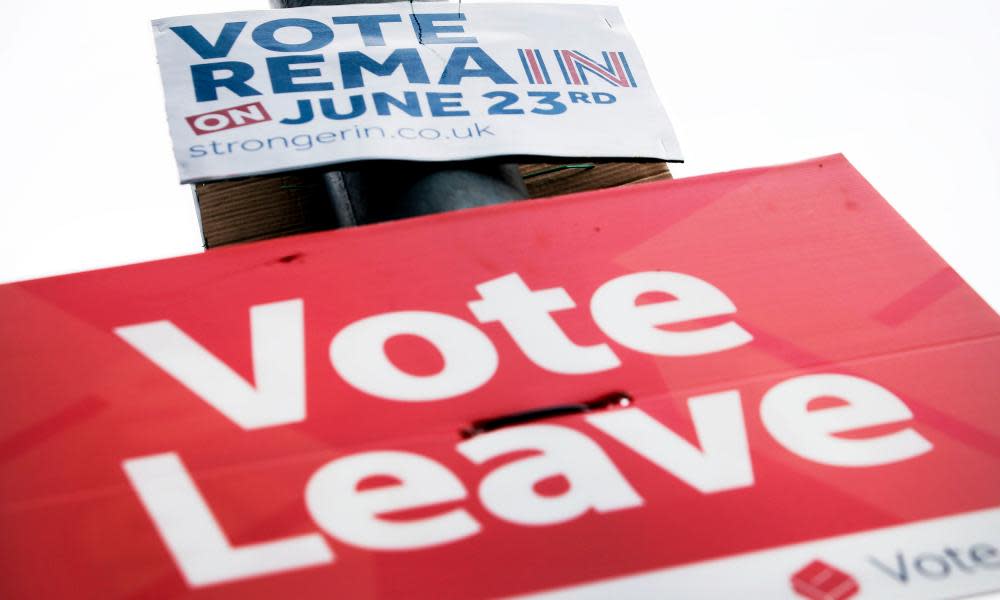Now the judges agree – the vote for Brexit was clearly tainted

The Electoral Commission, charged by parliament with ensuring the 2016 EU referendum was fair, unlawfully tilted the playing field in favour of leave. That’s the striking consequence of a high court decision from this morning.
Late last year, the Good Law Project (GLP) – of which I am director – sued the Electoral Commission in the high court on two grounds. First, it challenged the adequacy of the commission’s investigation into spending by Vote Leave. And second, it said that the EC had got the law wrong around donations.
Having initially said that both grounds were “without merit and not conceded in any respect”, the commission agreed to reopen its investigation into Vote Leave’s spending. It ultimately agreed with GLP that Vote Leave and Darren Grimes – founder of youth group BeLeave – had broken the law. Both have now been referred by the commission to the police.
This morning’s high court judgment deals with the second strand of GLP’s case – that the commission got the law wrong in taking the view donations could not count as spending.
Back in September last year, in a now deleted tweet, Dominic Cummings, the campaign director of Vote Leave, admitted that the commission had given Vote Leave the “extremely surprising” ruling that it could donate surplus monies to other leave campaigners.
And Vote Leave went on to do exactly that.
Because Vote Leave was up against its spending limits, it couldn’t spend in its own name. But the commission ruling opened the door for it to donate £620,000 to Grimes to pay for advertising services he purchased from AggregateIQ – the same data analytics and online advertising firm Vote Leave had been using for similar services – and to donate £100,000 to Veterans for Britain (which was also spent with AIQ).
Stronger In was also up against its spending limits. But because it didn’t get the advice from the commission, it had to stop spending. And this morning the high court decided that advice given to Vote Leave by the commission was wrong. The consequence is that the commission unlawfully tilted the playing field.
What does all this mean?
First, the commission – charged by statute with ensuring campaigners complied with the law – instead allowed Vote Leave to break it. The high court decision is absolutely excoriating: the commission was “unconstructive”, its actions lacked “any rational basis” and were “arbitrary”, and its approach to the law was a “recipe for abuse of the spending restrictions”. Heads must roll, beginning with that of Bob Posner, the commission’s legal counsel.
Second, the inevitable consequence of the high court decision is that Vote Leave has broken the law in two different ways: once with “common plan spending” with Grimes – the matter already referred to the police, and where Vote Leave acted without commission sign-off – and once by following the commission’s unlawful and “extremely surprising” advice.
Third, the size of Vote Leave’s overspending has increased. The consequence of the commission’s investigation was that over £600,000 spent by Grimes “should have been treated as incurred by Vote Leave”. But he was not the only recipient of Vote Leave’s largesse. There was also Veterans for Britain’s £100,000 bill with AggregateIQ. And, following the high court’s reasoning, this £100,000 should also count as Vote Leave’s spending. Vote Leave will have exceeded its spending cap by over 10%.
And fourth, there may be profound implications for the Democratic Unionist party. A BBC investigation by Jim Fitzpatrick suggests that the Constitutional Research Council – which donated £435,000 to the DUP to spend on “Vote to Leave” ads in the Metro newspaper (which is not published in Northern Ireland) and on AIQ – also controlled how that donation was spent.
If that is the case, a consequence of the high court’s decision will be that the council will have unlawfully incurred referendum expenses substantially in excess of the £10,000 limit, and so will have committed a criminal offence. The Good Law Project intends to write immediately to the EC inviting it to commence an investigation into the CRC – and threatening further judicial review proceedings if it will not.
These are not the findings of a government agency. These are the conclusions of the high court – and an immensely powerful court at that. One of the judges was a court of appeal judge at the time of the hearing, and the other is a court of appeal judge now. They have concluded that the regulator mismanaged the referendum. And the consequence is that Vote Leave has broken the law.
The government regulator in charge of ensuring the referendum was fair itself acted unlawfully and tilted the playing field in favour of leave. This isn’t democracy: it’s an embarrassment.
• Jolyon Maugham QC is the director and founder of the Good Law Project

 Yahoo News
Yahoo News 
